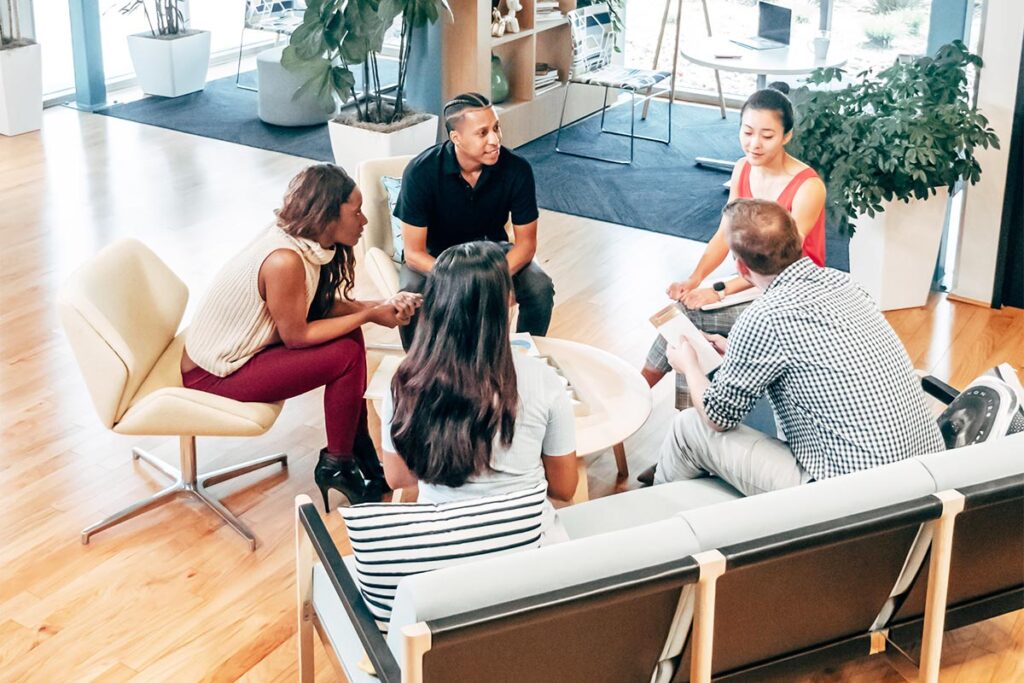Most people are very aware that social support and time with friends and family is beneficial for their mental health. That’s so much true that taking time to be social and to spend time around others tops the list on most mental health advice. Humans are social creatures, and we need support, a sense of belonging, and integration with our support networks in order to feel good and happy.
However, peer support, or time with your peers can be extremely important for understanding and getting perspective on your mental health and your recovery journey. Peers are people who struggle with similar problems, challenges, and journeys as you. They don’t understand exactly where you’re coming from, but they have similar insights and experiences. And, that can be immensely valuable to your recovery.
Feeling Accepted
If you’re in a random group of people, you know that they don’t really understand what you’re going through or how it impacts you. That means getting to talk about your problems without feeling judged. It means listening to other people with the understanding that they are behaving in ways similar to how you are behaving. And it means getting to be part of a community all going through the same problems.
That feeling of acceptance can be an important part of recovery. However, it can also move you towards finding better coping mechanisms, healthier ways to manage symptoms, and to improve your strategies for dealing with mental health. For many people, that also happens as they see other people facing the same issues and not taking care of them and mentally make the jump to what needs to happen for that care to happen – and then apply it to themselves.
Understanding You’re Not Alone
Peer support means you have people facing similar problems as you around you, helping you, listening, and sharing themselves. You get to feel like you’re not alone because you see others like you. And, you get to feel like you’re having a positive impact by being there. That can give the surface level benefit of feeling like you’re not alone. But, over time it also improves your self-esteem while reducing loneliness and anxiety. Why? If you see other people facing the same issues you do, it’s much harder to blame yourself for those issues or to feel like you’re broken or like there’s something wrong with you. It’s normal to have mental health problems. It’s so normal to have mental health problems that 22.8% of the population qualify for a mental health diagnosis – you’re not alone, you’re not broken, you just have a disorder you have to learn to cope with.
Getting Additional Perspectives
Seeing problems and symptoms through your own eyes is one perspective. But, getting to see how your peers view those same problems, how they cope with them, and how those problems impact them and the people around them can be eye-opening. For example, you might not realize that something is an aspect of your mental health problems only to find out that everyone else in your support group deals with the same issues. Getting those perspectives can be immensely valuable in figuring out what’s “you” and what’s “yours” because of mental health problems. Of course, you can work on behavior and improve your coping mechanisms in either case, but having those perspectives can be valuable.
- Seeing your coping mechanisms in a new way;
- Understanding how your behavior impacts others;
- Seeing which parts of your behavior are related to your disorder;
- Having a better understanding of your disorder;
- Seeing how people change as they get help and treatment.
Essentially, getting to see how other people handle your disorder can help you to better understand it in yourself.
Get your question answered now.

Sharing Experiences
Getting to share experiences with peers who understand those experiences and can listen nonjudgmentally is an important part of recovery for many. It means getting to talk about your experiences with problems and actually talk about those problems – rather than how other people feel about them. It also means getting space to share in an environment where everyone knows the symptoms causing experiences. People won’t all have the exact same experiences, however, you will have a good idea of what’s going on behind experiences and you can offer insight, share with each other, and get understanding from an audience of people going through the same things you are. Getting to do so can be extremely valuable for your self-esteem, for your feeling accepted, and for your ability to see yourself in a healthy way.
Of course, getting to share and listen also means you can add that same value to others. And, that can mean having a positive impact on everyone else in your group, which will be good for your self-esteem, your happiness, and your anxiety.
Social Accountability
Social accountability is a powerful factory in recovery and the primary reason that groups and self-help support groups work. If you have a group of people struggling with the same problems and managing them, you’re accountable to the group
What Makes Good Peer Support?
There are dozens of peer support groups that you can join. Many are sponsored by government and medical health organizations. In addition, many are self-help or support organizations intended to connect people with each other.
- Specific – Good groups are focused on groups or types of mental health disorder. This means that if you have schizophrenia, you want a group focused on schizophrenia. That’s also true with depression, bipolar disorder, or substance use disorder. You want to talk to people going through similar things to yourself, and those things can vary significantly between disorders. Therefore, you want a group focused on your problems.
- Structured – Whether you’re opting for therapist-led or self-help, your group should have a structure. This means you have a format to follow for meetings, you set themes, can you have someone to help you stay on topic. You can always meet up at extra points to socialize and to have unstructured meetings. However, setting goals can help you to actually get into meaningful topics and share the things you want to share – which will require prompting especially as you first get to know your peers.
- Compassionate – It’s important that your group be open, accepting, and compassionate. If you’re there and if you don’t fit in with most people there, you will have a harder time sharing. If you’re LGBTQA+ and there are people who are homophobic in the group, you won’t have a safe experience. Good group support requires that a group have moderation or that you be able to stay for a few meetings, get to know people, and then decide if it’s good and healthy for you after doing so.
In most cases, peer support starts in group therapy and treatment. However, there are plenty of self-help groups that you can look to as well.
Getting Help
If you or a loved one is struggling with mental health, peer support can do a lot for your self-esteem, self-image, and your ability to recover. However, it doesn’t count as treatment. If you’re having problems with mental health, seeking out a therapist and getting treatment for that is an important part of being able to recover.










